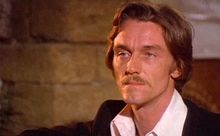John Steiner
This article includes a list of general references, but it remains largely unverified because it lacks sufficient corresponding inline citations. (January 2013) |
John Steiner | |
|---|---|
 Steiner in Waves of Lust (1975) | |
| Born | 7 January 1941 (age 80) |
| Occupation | Actor Estate agent |
| Years active | 1965-1991 (as actor) |
John Steiner (born 7 January 1941 in Chester, Cheshire) is an English actor. Tall, thin and gaunt, Steiner attended the Royal Academy of Dramatic Art, worked for a few years at the BBC and later appeared mostly in Italian films.
Career[]
Steiner found work primarily in films including Marat/Sade (1967), and the original Bedazzled (1967) with Peter Cook and Dudley Moore.[1] In 1969, Steiner was hired to play a part in the Spaghetti Western Tepepa, and also appeared opposite Franco Nero in White Fang, directed by Lucio Fulci. In 1971 he starred in the television series Hine.[2] In 1979 he featured in the leading role of Leo in a television production of Design for Living by Noël Coward.[3] He found himself in demand in Italy and moved there, appearing in a great number of Italian exploitation and B-films including police actioners (Violent Rome), westerns (Mannaja), war films (The Last Hunter), nazisploitation (Deported Women of the SS Special Section), sci-fi adventure films (Yor, the Hunter from the Future), and horror films, such as Mario Bava's Shock, Dario Argento's Tenebrae, and Ruggero Deodato's Body Count. He also became a favourite of famed Italian filmmaker Tinto Brass, featuring in Salon Kitty, the infamous Caligula, Action, and Paprika.[4] Steiner was in very steady demand until the late 1980s. As the Italian film industry dwindled, Steiner retired from acting in 1991 and moved to California, where he became a real estate agent.
Steiner has recently contributed to DVD extras on some of his films and given interviews about his Italian work.
Selected filmography[]
- Marat/Sade (1967) - Monsieur Dupere
- Bedazzled (1967) - TV Announcer (uncredited)
- Work Is a Four-Letter Word (1968) - Anthony
- Tepepa (1969) - Doctor Henry Price
- The Thirteen Chairs (1969) - Stanley Duncan
- El bosque del lobo (1970) - Robert
- A Girl Called Jules (1970) - Luciano
- May Morning (1970) - Roderick Stanton
- L'asino d'oro: processo per fatti strani contro Lucius Apuleius cittadino romano (1970) - Aristomene
- Bali (1970) - Arthur Glenn
- The Case Is Closed, Forget It (1971) - Biro
- Slap the Monster on Page One (1972) - Ingegner Montelli
- The Police Serve the Citizens? (1973) - Lambro
- Massacre in Rome (1973) - Col. Dollmann
- Black Holiday (1973) - Scagnetti
- White Fang (1973) - Charles 'Beauty' Smith
- Morel's Invention (1974) - Morel
- Challenge to White Fang (1974) - Beauty Smith / Charles Forth
- The Last Day of School Before Christmas (1975) - Il Tenente
- I Don't Want to Be Born (1975) - Tommy Morris
- Waves of Lust (1975) - Giorgio / Husband
- Violent Rome (1975) - Franco Spadoni 'Chiodo'
- Dracula in the Provinces (1975) - Count Dragulescu
- Salon Kitty (1976) - Biondo
- Le guêpier (1976) - Fisher
- Mark Strikes Again (1976) - Paul Henkel
- Deported Women of the SS Special Section (1976) - Herr Erner
- Bloody Payroll (1976) - Fausto
- Plot of Fear (1976) - Hoffmann
- (1977) - Schwein
- Shock (1977) - Bruno Baldini
- Mannaja (1977) - Valler
- The Criminals Attack, The Police Respond (1977) - Rufy
- Gangbuster (1977) - Killer
- Antonio Gramsci: The Days of Prison (1977) - Laurin
- Goodbye & Amen (1978) - Donald Grayson
- L'Amour en question (1978) - Tom Hastings
- Caligula (1979) - Longinus
- Action (1980) - The Manager
- The Last Hunter (1980) - Major William Cash
- Car Crash (1981) - Kirby
- The Salamander (1981) - Captain Roditi
- Hunters of the Golden Cobra (1982) - Captain David Franks
- Tenebrae (1982) - Christiano Berti
- Yor, the Hunter from the Future (1983) - Overlord
- Dagger Eyes (1983) - Ivanov
- The Ark of the Sun God (1984) - Lord Dean
- I due carabinieri (1984) - Crazy Man on Train
- A.D. (1985, TV Mini-Series) - Simon the Magus
- Cut and Run (1985) - Vlado
- Commando Leopard (1985) - Smithy
- The Berlin Affair (1985) - Oskar Engelhart
- Troppo forte (1985) - Mr. Adams
- Operation Nam (1986) - James Walcott
- Body Count (1986) - Dr. Olsen
- Summer Night (1986) - Frederick, Fulvia's lover
- (1986) - Skorm
- Julia and Julia (1987) - Alex
- Night of the Sharks (1988) - Rosentski
- (1988) - Duclaud
- Striker (1988) - Kariasin
- Appuntamento a Liverpool (1988)
- Sinbad of the Seven Seas (1989) - Jaffar
- Massacre Play (1989) - Danilo
- Paprika (1991) - Principe Ascanio (final film role)
External links[]
References[]
- ^ "John Steiner | Movies and Filmography". AllMovie.
- ^ "The Little White Lady (1971)". BFI.
- ^ Play of the Month: Noël Coward's Design for Living, BBC Genome, accessed 31 March 2020
- ^ "John Steiner". BFI.
- English male television actors
- Male Spaghetti Western actors
- 1941 births
- Living people
- English male film actors
- Actors from Chester
- Male actors from Cheshire
- English expatriates
- British estate agents (people)
- Alumni of the Royal Academy of Dramatic Art